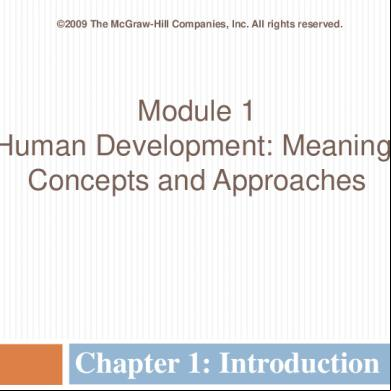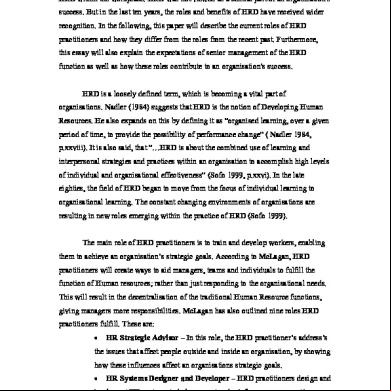Controversies About Human Development 2e4t3t
This document was ed by and they confirmed that they have the permission to share it. If you are author or own the copyright of this book, please report to us by using this report form. Report 2z6p3t
Overview 5o1f4z
& View Controversies About Human Development as PDF for free.
More details 6z3438
- Words: 514
- Pages: 2
CONTROVERSIES ABOUT HUMA DEVELOPMENT 1. inherently bad versus inherently good 2. Nature versus nurture (Arthur Jensen and B.F. Skinner) 3. Activity versus ivity 4. continuity versus discontinuity THEORIES OF HUMAN DEVELOPMENT 1. psychoanalytic theory 2. psychosocial theory 3. learning or behavioral theory 4. social learning theory 5. cognitive-development theory 6. moral theory 7. ethological theory 8. sociobiological theory PSYCHOANALYTIC THEORY (FREUD) Psychodynamic forces – psychic or mental energy 2 biological instincts 1. Eros – life instinct 2. Thanatos – death instinct 3 components of personality 1. Id – legislative – pleasure principle 2. Ego – executive – reality principle 3. Superego – judicial – perfection PSYCHOSEXUAL THEORY (FREUD) Fixation – tendency to stay at a particular stage 1. oral stage (1st year of life) – gratification form the mother 2. anal stage (2nd to 3rd year of life) - gratification along rectal area 3. phallic stage – (4th to 5th year of life) – gratification involving the genitals 4. latency stage (6th year to puberty) – sexual desire are repressed 5. genital stage (puberty onwards) – maturation of reproductive system PSYCHOSOCIAL THEORY (ERIK ERIKSON) 1. trust versus mistrust (birth to 1 year) 2. autonomy versus shame and guilt (2-3 years) 3. initiative versus guilt (4-5 years) 4. Industry versus inferiority (6-11 years) 5. Identity versus role confusion (12-18 years) 6. Intimacy versus isolation (young adulthood) 7. Generativity versus stagnation (middle adulthood) 8. Integrity versus despair – old age
BEHAVIORAL THEORY (JOHN B. WATSON) 1. classical conditioning 2. operant conditioning 3. observational learning SOCIAL LEARNING THEORY 1. Neo-Hullian Theory (john dollard and neil miller) 2. Skinners operant learning approach 3. Banduras cognitive social-learning theory COGNITIVE-DEVELOPMENTAL THEORY (JEAN PIAGET) 1. sensorimotor stage (birth to 2 years) 2. preoperational stage (2-7 years) 3. Stage of concrete operation (7-11 years) 4. Stage of formal operation (11 years and older) MORAL THEORY (LAWRENCE KOHLBERG) 1. Level one – preconventional morality Stage 1 – punishment-obedience orientation Stage 2 – instrumental relativist orientation 2. Level two – conventional morality Stage 3 – good boy – nice girl orientation Stage 4 – law and order orientation 3. Level 3 – post conventional morality Stage 5 – social contract orientation Stage 6 – universal ethical principal orientation ETHOLOGICAL THEORY (CARINS) SOCIOBIOLOGICAL THEORY (BELL AND BELL)
Continuity - additive process that occurs in small steps, without sudden change Discontinuity – developing skills proceed a series of abrupt changes Developmental stage – is a distinct period of the life cycle characterized by a particular set of abilities, motives, behavior, emotion Theory- set of concepts and propositions that help to describe and explain observations that one has made Epigenetic principle – anything that grows has a ground plan, and out of this ground plan the parts arise Mistrust – a child is chaotic, unpredictable, and rejecting Industry – parents and teachers who , reward and praise children Inferiority – rebuff, deride or ignore children’s efforts Role confusion – adolescent fails to develop a centered identity or negative identity Intimacy – the capacity to reach out and make with other people Generativity – reaching out beyond
BEHAVIORAL THEORY (JOHN B. WATSON) 1. classical conditioning 2. operant conditioning 3. observational learning SOCIAL LEARNING THEORY 1. Neo-Hullian Theory (john dollard and neil miller) 2. Skinners operant learning approach 3. Banduras cognitive social-learning theory COGNITIVE-DEVELOPMENTAL THEORY (JEAN PIAGET) 1. sensorimotor stage (birth to 2 years) 2. preoperational stage (2-7 years) 3. Stage of concrete operation (7-11 years) 4. Stage of formal operation (11 years and older) MORAL THEORY (LAWRENCE KOHLBERG) 1. Level one – preconventional morality Stage 1 – punishment-obedience orientation Stage 2 – instrumental relativist orientation 2. Level two – conventional morality Stage 3 – good boy – nice girl orientation Stage 4 – law and order orientation 3. Level 3 – post conventional morality Stage 5 – social contract orientation Stage 6 – universal ethical principal orientation ETHOLOGICAL THEORY (CARINS) SOCIOBIOLOGICAL THEORY (BELL AND BELL)
Continuity - additive process that occurs in small steps, without sudden change Discontinuity – developing skills proceed a series of abrupt changes Developmental stage – is a distinct period of the life cycle characterized by a particular set of abilities, motives, behavior, emotion Theory- set of concepts and propositions that help to describe and explain observations that one has made Epigenetic principle – anything that grows has a ground plan, and out of this ground plan the parts arise Mistrust – a child is chaotic, unpredictable, and rejecting Industry – parents and teachers who , reward and praise children Inferiority – rebuff, deride or ignore children’s efforts Role confusion – adolescent fails to develop a centered identity or negative identity Intimacy – the capacity to reach out and make with other people Generativity – reaching out beyond





